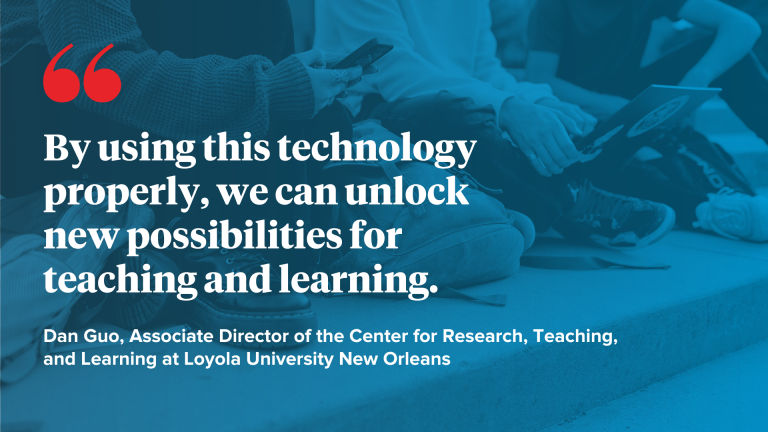
In the age of digital transformation, the educational landscape is facing a pivotal moment.
From secondary school classrooms to higher education institutions, the explosion of Artificial Intelligence (AI) tools, like ChatGPT, is either being embraced with optimism or blocked by fear.
At Instructure, we remain committed to exploring AI's potential as a tool to improve teaching and learning and make education more accessible and effective. More broadly, we see AI technology as a tool students will use throughout their life-long learning journey, creating a steady buzz of discussion about its implications in the classroom.
"[Artificial intelligence] is new, but it's not unique in terms of what students have access to on the internet already; it just packages it all into a very user-friendly experience. Our faculty started coming around to it once we started flipping the script and showing how it can make their lives easier and teaching more effective." - Dr. Barrett Schwartz, Instructional Designer at the University of Memphis.
Initial Reaction to Artificial Intelligence in The Classroom
The response to AI has been a mix of excitement and caution. While there was initial pushback, there are many educators embracing tools such as ChatGPT for themselves and started slowly integrating them into their classrooms.
"I came up through college when Google was starting to become a thing, and professors wouldn't let us use Google because it was plagiarism. And in reality, it's a starting point; it's a way of researching. And that's kind of how teachers are selling [ChatCPT] to students right now. It's a way of starting research, maybe finding templates, ideas, or jumping off points to move forward with their assignments." - Desi Vuillaume, Teacher & Technology Innovation Facilitator at Carl Sandburg High School in Orland Park, Illinois.
Like the internet or calculators, artificial intelligence and ChatGPT are tools to support education. They should be seen as a complement to human teaching, augmenting the educational experience rather than replacing it. As educators become more comfortable with utilising and integrating artificial intelligence, it can enhance education, foster personalised learning, and equip students with the skills they need to thrive in an ever-changing world.
"ChatGPT is a powerful and accessible tool that allows all of us to accomplish so many tasks more effectively and efficiently. So I believe that by using this technology properly, we can unlock new possibilities for teaching and learning." - Dan Guo, Associate Director of the Center for Research, Teaching, and Learning at Loyola University New Orleans.
Ways Educators Are Implementing AI in The Classroom
Artificial Intelligence is reshaping education by fostering personalised learning, enabling adaptive instruction, and empowering both students and educators. In conversations with many of our valued customers, they’ve shared the positive impact they’re seeing.
Enhanced Learning Experiences:
ChatGPT opens doors to enhanced learning experiences by providing personalised support, instant feedback, and access to a vast knowledge base. Here's how it can reshape education:
- Personalised Assistance: ChatGPT's ability to understand and respond to students' prompts enables personalised learning experiences. Students can seek clarification, delve deeper into topics, and receive tailored guidance, promoting a deeper understanding of concepts.
- Educator Efficacy: ChatGPT empowers educators by providing reliable AI assistance, saving time on administrative tasks, offering access to teaching resources, and supporting curriculum adaptation and instructional strategies. This enhances educator efficacy and enables personalised instruction for meaningful learning experiences.
- Interactive Learning: Incorporating ChatGPT into online learning platforms or virtual classrooms allows for interactive and engaging experiences. Students can engage in simulated conversations, participate in dialogues, and practice language skills, fostering communicative competence and collaboration.
- Creative Writing and Critical Thinking: ChatGPT can serve as a writing companion, assisting students in brainstorming ideas, improving sentence structures, and expanding their vocabulary. Providing real-time suggestions encourages creativity, critical thinking, and effective communication.
Integration into the Curriculum:
To maximise the effectiveness of ChatGPT in education, strategic integration into the curriculum is vital. Here are some considerations for educators:
- Pedagogical Alignment: Educators should align the use of ChatGPT with pedagogical goals and teaching methodologies. Integrating it seamlessly into lesson plans ensures that it enhances learning outcomes rather than being a mere novelty.
- Supplemental Tool: ChatGPT should be a supplementary tool, complementing traditional teaching methods and human interaction rather than replacing them entirely. It can augment the learning experience by providing additional resources and support.
- Ethical Use and Data Privacy: Educators must address ethical considerations and prioritise student data privacy. Clear guidelines on data usage, informed consent, and responsible AI practices should be established to maintain trust and ensure student well-being.
- Monitoring and Evaluation: Regular monitoring and evaluation of ChatGPT's impact on student learning are crucial. Assessing its effectiveness, collecting student feedback, and making necessary adjustments ensure continuous improvement and adaptability.
Artificial Intelligence is Here
Artificial intelligence in education is brimming with potential, promising to reshape the way we learn and teach - and we're now experiencing it in real-time. As technology continues to advance, AI is set to play a pivotal role in transforming education into a more personalised, efficient, and inclusive experience.
"There are a lot of good conversations to be had about how AI will dislodge and reformat what a good education looks like, but we can't forget that a big part of this is giving our students a better future. And part of that is equipping them with the tools they need to make that future possible. And AI is one of those tools." - Dr. Barrett Schwartz, Instructional Designer at the University of Memphis.
Over the next few weeks, we’ll be publishing a series of how-to tips, guides, and insights as we continue to navigate the evolving AI landscape, and we are excited for a big announcement at InstructureCon ‘23 July 26th.
To deep-dive into additional educator tips, watch our on-demand webinars on AI's potential for disruption in education.
Related Content
 canvas-biz-investment.jpg
canvas-biz-investment.jpgBlogs
 Upskilling and Reskilling Preparing Students for a Modernized Workforce.png
Upskilling and Reskilling Preparing Students for a Modernized Workforce.pngBlogs
 skills-forward.jpg
skills-forward.jpgBlogs